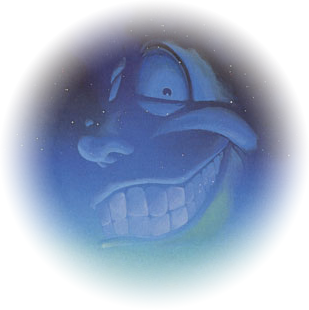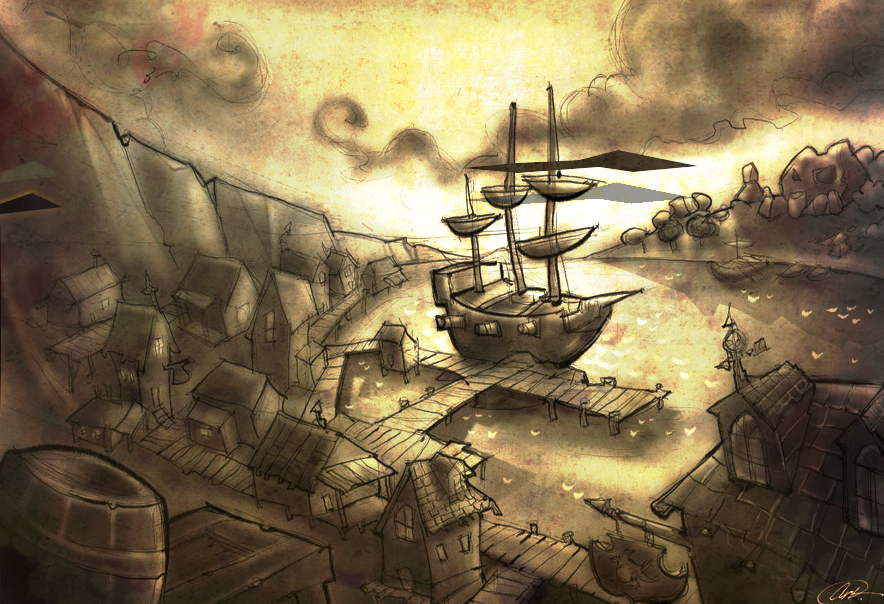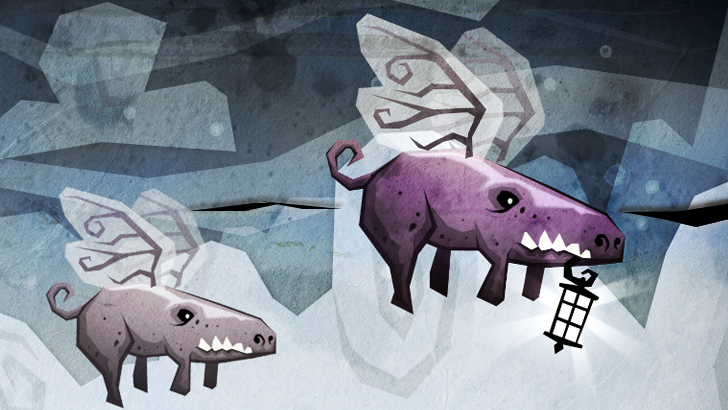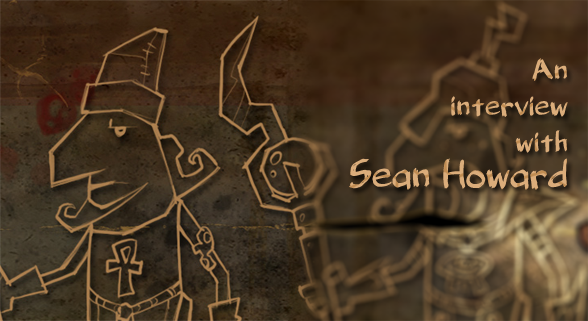Sean Howard isn't a name you probably recognize, but he is important to Mojo becase he was the dialogue writer on DeathSpank. Plus, he likes the site. He also blogs a bit, tries to come-up with original game mechanics, and has an ongoing webcomic. His views are always interesting, so doing an interview was mandatory.
1. First-off, could you give any readers who might not be familiar with you an introduction to the world of Sean Howard? Who are you, Sean Howard, and how did you come to be a green squid alien?
I'm the creator of the webcomic A Modest Destiny and I wrote some of the dialogue for DeathSpank. That's pretty much the sum total of my accomplishments. I yell at people on the internet. Does that count?
The squid-headed avatar I use is based off an old Mighty Max toy (it's sort of like Polly Pocket, but for boys). My Google-fu says that the character's name is Dr. Kalamarus. But I tend to tell people that it is just a mind flayer because I don't want to admit that I played with Polly Pocket For Boys when I was 15.

2. How did you end-up working on the "Deathspank" games? Were you always going to be a writer, or did you start-off as something else and then drift into writing?
Short version? I grew up wanting to make games. When I was a kid, thirty years ago, if you wanted to make games, you were a programmer. So I became a programmer. Went to college with a computer science major. Spent a year getting into the game industry only to find out that it had either changed or it simply didn't match my idealized concept of what it should be. Lasted six months.
After the game industry, I was sitting around not knowing what to do with my life. And like most people in that situation, I started a webcomic. That was literally the first story I ever tried to write. I never wanted to be a writer, but it just sort of happened and I enjoy it.
With DeathSpank, I saw that Ron Gilbert was making a new game that wasn't for kids. I count Maniac Mansion as the singular influence in my life that drove me towards making games, so despite my reticence with going back to the game industry, I sent my resume in. They weren't even hiring, and I didn't really apply for any particular job. I said, I'm a programmer but I do all this other stuff, here's my website. I guess Ron liked my comic and asked if I'd like to write something for DeathSpank.
Then there was about a year and a half of me emailing Ron every two weeks asking if I could do it yet. And he'd always say, almost there, ask again in two weeks. Finally, he gave me a writing test - I'm sure it was just so he could shut me up for a while - and I guess it wasn't absolutely horrible. It was Eubrick's dialogue and is actually in the game.
3. How does writing on a project like Deathspank go, anyways? And how involved were you in the creation of the story, as opposed to writing the dialogue?
Essentially, they'd send me an outline of a dialogue already written along with a paragraph about the character and where he fit into the quest line. Then I went over it and made as many terrible puns as I could. I wasn't really involved with the creative parts of DeathSpank. My main creative contributions were convincing them to let me invent my own history of felt and the purposely bad rhyming couplets for Mr. Frangtrangle's riddles.
4. I was reading your blog post on writing game characters, and you mentioned how RPG heroes are typically clueless about their world at large. An interesting choice you guys made with Deathspank was to give him a backlog of completed quests. But isn't the game an RPG of sorts? What caused you to approach the game like that?
Like I said, I wasn't really involved with the creative aspects of the game. I have, probably, very different ideas about game design than Ron or anybody at Hothead.
If I remember correctly, that blog was about why we keep seeing the same few characters show up again and again. The reason why RPGs have clueless protagonists is that it is difficult for the character to have information about the world that the player doesn't. In the case of DeathSpank, all his previous adventures took place off screen, somewhere else. He's still exploring this world and meeting its inhabitants for the first time. And I wouldn't exactly say that DeathSpank was clueful - or whatever the opposite of clueless is.
I think the decision to make DeathSpank an experienced adventurer was basically a chance to get the player into the story quickly. We writers have a fancy Latin phrase for it: "In media res". We writers like to seem smart by using Latin. We're dicks that way.

5. What was the process of re-writing like once Deathspank ceased being episodic and became a full-fledged game?
That decision was made at some point before I started writing anything. All I know was that it was an arduous process and that lives were lost. Not sure how many, though. More than four.
6. You know, I've been reading your blog and something kind of confused me. You mentioned in a recent post how you admired games that held onto "an identity...tied to past technologies". Yet you also wish games were a little crazier, more dangerous, and took bigger risks. Isn't that something of a contradiction?
I think that's two different things. I think that when you set out to create a new franchise, you need to aim at creating something new and different. If you just create Call of Duty... IN SPACE, then what have you really accomplished?
But at the same time, I really respect games like Dragon Quest and Pokemon because they've been able to maintain this identity through multiple qualitative updates. I mean, Dragon Quest IV was on the NES. The enemies were static images on a black background because the NES couldn't handle them as sprites. The remake on the DS is in full 3D with fully animated, beautifully done pixel art enemies. Despite the fact that the technology is so fundamentally different, I'm amazed by how these games manage to retain such core identity.
It's fascinating. Why does using the same battle sounds as the NES version do that? How do they know which parts to upgrade to keep the experience fresh, and which parts to retain to keep it from becoming something else?
Play Pokemon Silver next to Pokemon SoulSilver and the differences will just floor you. But play [them] a few years apart and you'd swear they were the same game!
I think part of the draw of franchises is that identity. When people get excited for a new Zelda game, that's what they are looking for. There's a certain amount of comfort and familiarity there. But people want you to move forward without losing that identity. Why did Mario 64 feel like a Mario game but Zelda 2 feels off somehow? It's an interesting subject, to say the least.
But that's if you already have a franchise. A lot of new franchises make the mistake of trying to take someone else's identity. Dead Space is a good example. It's got bits of BioShock, Resident Evil 4, and Event Horizon. To me, it feels like a polished experience, but it feels like someone else's polished experience. Dead Space has no identity to me. When I get around to playing Dead Space 2, my primary interest is in how different it will be, not how much identity it retains.
7. Congratulations on finishing season four of your webcomic, A Modest Destiny! I read through the first and second seasons, and got into the world and the characters. Did you ever think of adapting the series into a game, perhaps based on something from Three Hundred Mechanics? (For those who don't know, Mechanics is Howard's come-up-with-new-game-mechanics-a-day project. It's kind of in limbo, but worth checking out.)
Of course. Started them a dozen times. I think the reason I don't finish is because I end up designing games that are far too complex for one person to ever finish. It's just the types of games that I like. It's easy for a programmer to say that there will be fifty types of units, but the artist will just flip him off and storm out of the room. When I'm both the programmer and the artist, I end up have too many arguments with myself. Voices are raised. Things are thrown. It's not pretty.

8. Your game collection is enormous, and you buy an average of 12 games per month. I was hoping you'd tell people, in your opinion, what the most important games ever made are - even if they're just the ones that are important to you personally. I know you rank Maniac Mansion as among these...
This is always a tough question because my list would likely look at lot like anyone else's. I mean, you got your Maniac Mansions and Marios and Grim Fandangos and Planescape: Torments and, of course, Deus Ex. But the reason my collection is so large is because I'm always looking for the diamonds in the rough. The games that nobody else plays that have virtue and merit and wonderment and fascination. If I limited myself to just a few games a year, I'd just buy the big releases that I enjoy but largely buy out of habit and obligation. I'd totally miss the small releases that I usually end up loving more.
I like all games. The good, the bad, and the ugly. Together they make something that I am just truly proud to be a part of. Also, I'm probably a hoarder.
If I could just single out one game, there's a Namco Gameboy Color game that came out when I lived in Japan called Seme COM Dungeon Druaga that I basically consider the epitome of game design - and I'm apparently the only one who has ever played it (even in Japan). It's half collectible card game, half roguelike capture the flag, half dungeon building, half Namco fanservice and it's 200% pure awesome. Probably my favorite game of all time. It hit all the right notes for me. It's the game I would make if I could make games.
9. I read on your blog how you think the games industry has become just that - an industry. What do you mean by that? How do you think games could come out of it and get someone like you less jaded again?
I'm jaded about how games are made, not the games themselves. I think the programmers and artists and technicians and designers and writers all put a little bit of themselves into their creations, and I'm frequently in awe of what they've done. Even something like Dead Space, which I was just a little hard on, I can respect for that reason.
But I've seen how sausage is made, and I just can't think about it while eating it without feeling a little sick to my stomach. There's right reasons and just reasons and beautiful reasons to make games, and that just doesn't seem to be the driving impulse of the game industry anymore. Great games are still being made, but at what cost? Do the ends justify the means? I just can't help but wonder what amazing games publishers are turning down in favor of Call of Duty 15.
10. Finally, what are you working on now?
I just finished the fourth season of my comic after a five year hiatus, but I've still got to write an ending. My fans have been waiting long enough and, frankly, they won't leave me alone. If they haven't moved on by now, they aren't going to. I don't want to be in my grave and have people kicking over my tombstone shouting, "You said you'd finish AMD, you jerk!"
